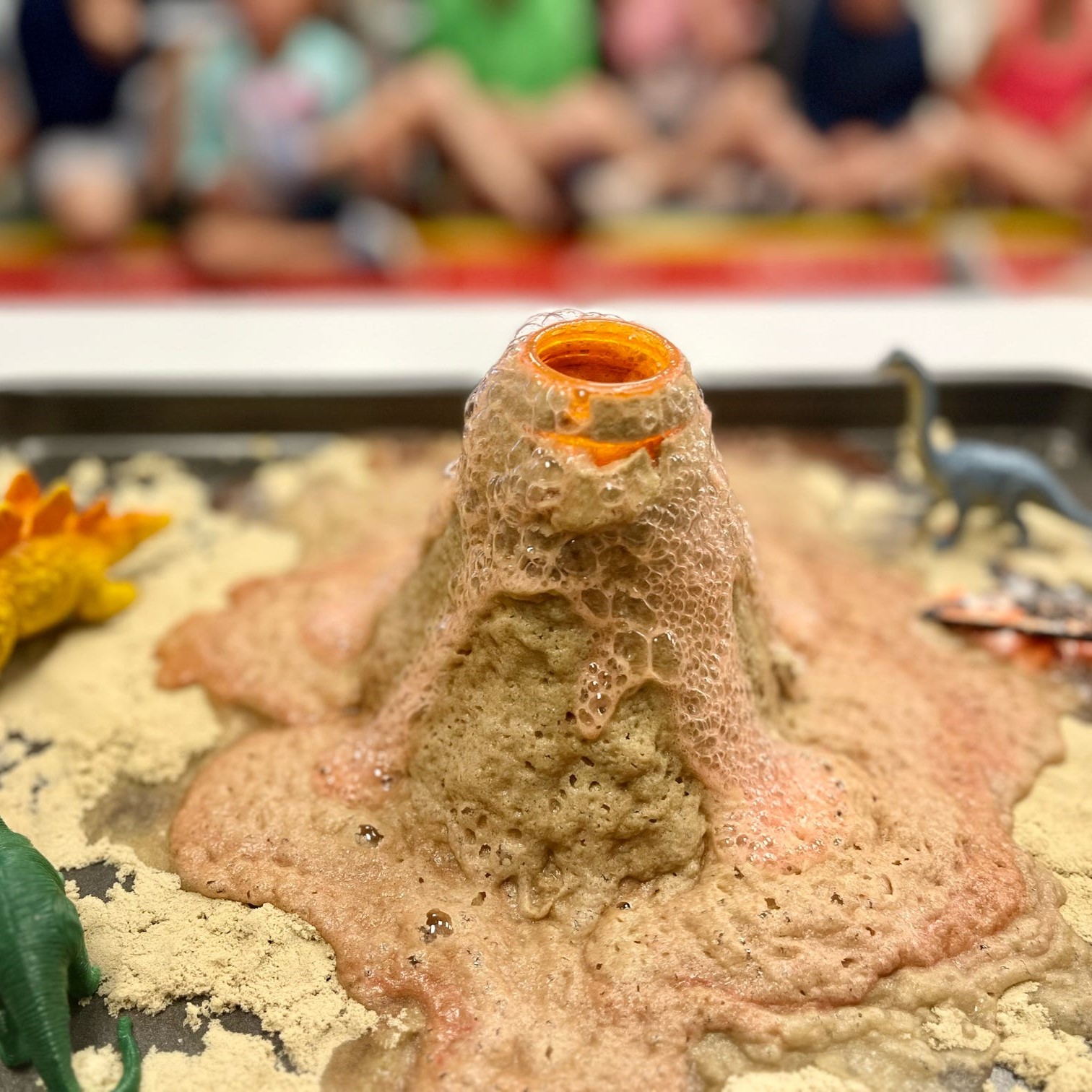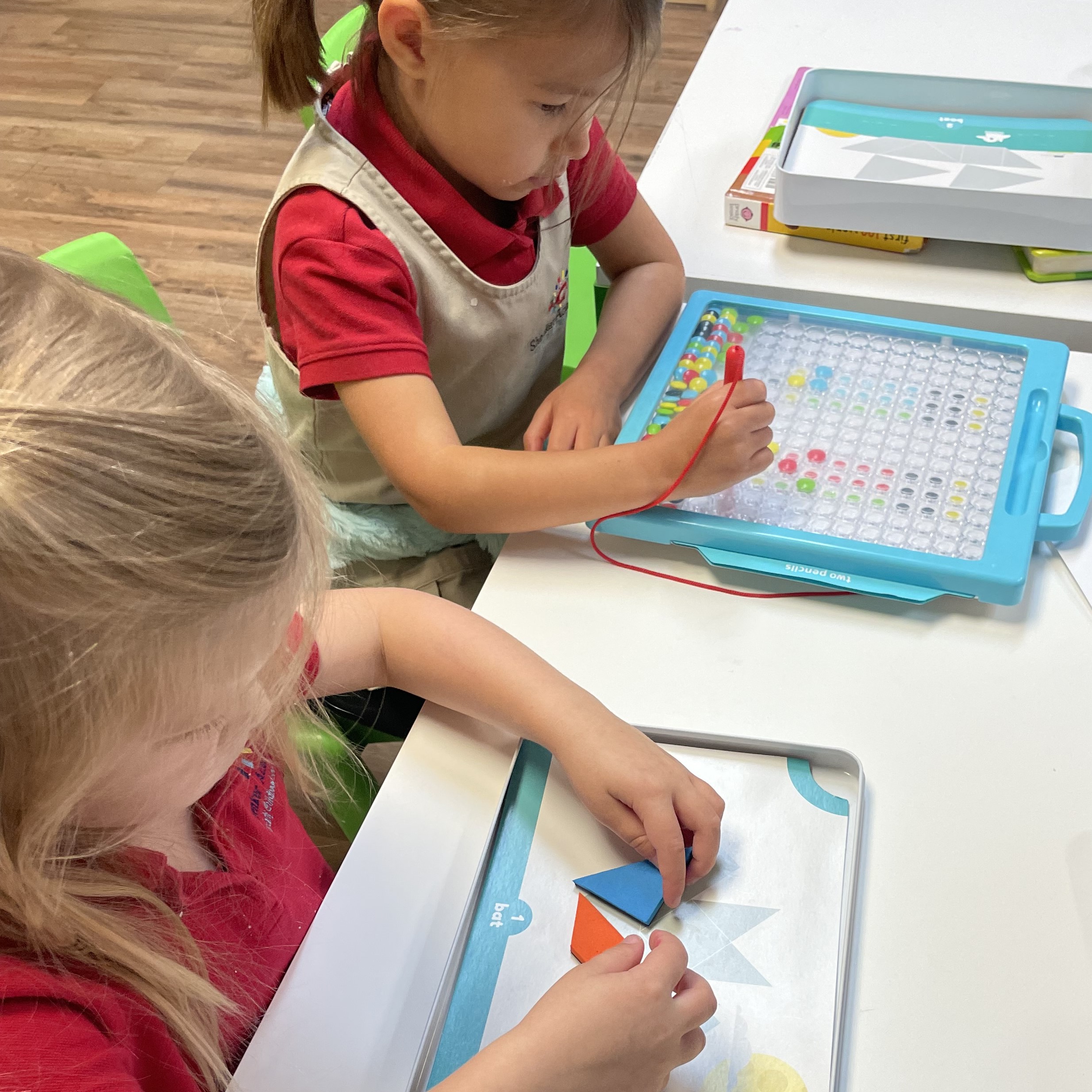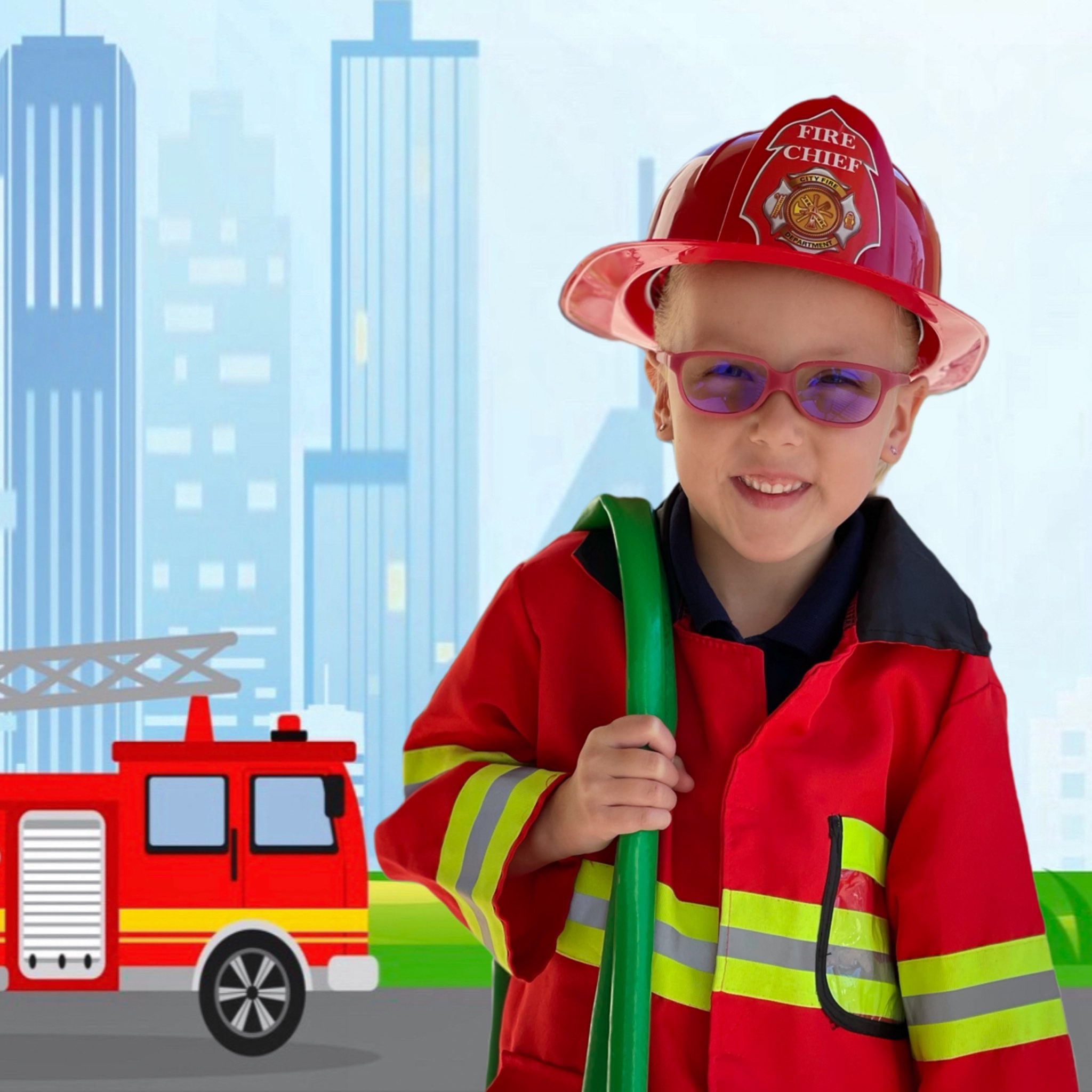




Multiple Intelligence Theory
Our goal is for children to develop individual creativity, independent thinking, and higher levels of problem-solving. The Shenker Academy focuses on the multiple intelligences theory to understand and enhance each child’s individual learning process.
The Shenker Academy follows developmentally appropriate practices outlined by the National Association for the Education of Young Children as well as the state curriculum guidelines set forth in the Nevada Pre-K Standards and Early Learning Guidelines and the Common Core Standards (Math & Language Arts) for Early Education & Kindergarten. The Shenker Academy created the guide below to outline the four domains that need to be developed in young children; cognitive, physical, social, and emotional, along with the six basic bits of intelligence of the Howard Garner Multiple Intelligence Theory. The guide is also reflective of the Pre-K and Early Learning Standards depending on a child’s age and stage of development.
Example from the Verbal Linguistic/Cognitive Domain: A two-year-old child will experience hearing and reciting rhymes during a teacher-directed storytime but as a child’s stage of development changes and a child becomes older they will not only listen and recite rhymes but begin to create their own and become phonemically aware of the sounds of letters and words. The child will too make a transition to creative learning through written expression, expressive fine art, and hands-on activities.
Below is a guide for parents and it is reflective of what all students, no matter the age, will be exposed to in the classrooms.
Verbal Linguistic Cognitive Domain
Reading
- Books, novels, poems, essays, short stories, plays
Speaking & Discussion
- Communicating ideas
- Sharing ideas
- Discussion & Debate
- Storytelling
- Exploring riddles & rhymes
Writing
- Use the writing process
- Creative & descriptive writing
- Comparing & contrasting
- Journal writing
Language Development
- Practice grammar & spelling
- Learn vocabulary words
- Practice vocabulary words
- Learn a second language
Bodily/Kinesthetic Physical Domain
Body Expression
- Act out a role, word, concept
- Perform dance or movement
- Learn Sign Language
- Use physical gestures
“Hands-On” Learning
- Create projects, props, crafts
- Explore learning materials
- Visit places
Fine Motor Skills
- Use tools
- Play games requiring hand-eye coordination or fine motor skills
- Assemble/disassemble machines or appliances
Physical Exercise
- Hop, skip, jump, run, stretch
- Play sports or games
Logical/Mathematical Cognitive Domain
Logical & Higher-Level Thinking
- Analyze data
- Apply information
- Brainstorm ideas
- Compare and contrast
- Classify and categorize
- Conduct experiments
- Discover patterns, trends
- List or organize facts
- Formulate/test hypothesis
- Make predictions
- Sequence events
Math
- Use math manipulatives
- Build answers
- Play number games
- Solve story, math problems
- Make graphs
- Calculate/estimate the probability
Natural Cognitive Domain
Observe
- Observe natural surroundings
- Take a field trip
Record Observations
- List characteristics
- Record changes, developmental stages
- Record color, size, form, function
- Use log, journal, graph
In or with Nature
- Capture nature with photos
- Care for classroom pets
- Collect specimens
- Grow flowers, plants, vegetables
Classify & Categorize
- Classify by color, size, form, function
- Sort and categorize natural and non-natural items
Verbal/Spatial Cognitive Domain
Arts & Crafts
- Create a collage, montage
- Create a pattern/texture
- Make, design, or create
- Paint or draw
- Make sculptures
- Play with colors
- Draw a scene from the story/math problem
- Illustrate a book
Speaking & Discussion
- Do guided imagery
- Fantasize or visualize
- Imagine or pretend
- Mind map
Visualization
- Build or draw in 3D
- Make or read maps
- Play with geometric shapes
- Play with puzzles, mazes
- Use graphic organizers
Interpersonal Social/Emotional Domain
Work Together
- Process interactions
- Debate issues
- Practice taking turns
- Work on communication skills
- Share with others
- Work collaboratively with peers on projects
- Do team building and class building
Solve Conflicts
- Practice compromising
- Practice mediation skills
- Reach consensus
- Role-play
- Solve problems as a team
Organize Others
- Assign roles or tasks
- Mediate conflicts
- Motivate others
- Plan an event or activity
Music/Rhythmic Cognitive/Physical Domain
Create Music
- Compose a melody
- Copy sounds and melodies
- Hum, clap, click, bang, snap-in tune
- Write a song, poem, jingle
Perform
- Play with instruments
- Play, sing a solo or as a class
Learn About Music
- Evaluate music
- Learn about instruments
- Listen to music from different times, genres, cultures
Learn Through Music
- Change the words to a song or jingle
- Interpret lyrical meaning
- Write or sing a song
- Listen to curriculum music songs
- Listen to music, background music
Intrapersonal Social/Emotional Domain
Set Goals & Priorities
- Set goals and work on achieving goals
- Make an action plan
Reflection & Introspection
- Describe feelings about a topic, situation
- Reflect on learning, activities
- Make journal entries
- Read silently
- Relate content to personal experiences
- Weigh alternatives
- Think about actions
- Work independently
Values & Beliefs
- Choose between alternatives
- Defend position, take a stand
- Express like/dislikes
- Respond to hypothetical ethical dilemmas
- Write rules of conduct
Multiple
Intelligence Theory
Multiple Intelligence Theory
Our goal is for children to develop individual creativity, independent thinking, and higher levels of problem-solving. The Shenker Academy focuses on the multiple intelligences theory to understand and enhance each child’s individual learning process.
The Shenker Academy follows as developmentally appropriate practices outlined by the National Association for the Education of Young Children as well as the state curriculum guidelines set forth in the Nevada Pre-K Standards and Early Learning Guidelines and the Common Core Standards (Math & Language Arts) for Early Education & Kindergarten. The Shenker Academy created the guide below to outline the four domains that need to be developed in young children; cognitive, physical, social, and emotional, along with the six basic bits of intelligence of the Howard Garner Multiple Intelligence Theory. The guide is also reflective of the Pre-K and Early Learning Standards depending on a child’s age and stage of development.
Example from the Verbal Linguistic/Cognitive Domain: A two-year-old child will experience hearing and reciting rhymes during a teacher-directed storytime but as a child’s stage of development changes and a child becomes older they will not only listen and recite rhymes but begin to create their own and become phonemically aware of the sounds of letters and words. The child will too make a transition to creative learning through written expression, expressive fine art, and hands-on activities.
Below is a guide for parents and it is reflective of what all students, no matter the age, will be exposed to in the classrooms.
Verbal Linguistic Cognitive Domain
Reading
- Books, novels, poems, essays, short stories, plays
Speaking & Discussion
- Communicating ideas
- Sharing ideas
- Discussion & Debate
- Storytelling
- Exploring riddles & rhymes
Writing
- Use the writing process
- Creative & descriptive writing
- Comparing & contrasting
- Journal writing
Language Development
- Practice grammar & spelling
- Learn vocabulary words
- Practice vocabulary words
- Learn a second language
Bodily/Kinesthetic Physical Domain
Body Expression
- Act out a role, word, concept
- Perform dance or movement
- Learn Sign Language
- Use physical gestures
“Hands-On” Learning
- Create projects, props, crafts
- Explore learning materials
- Visit places
Fine Motor Skills
- Use tools
- Play games requiring hand-eye coordination or fine motor skills
- Assemble/disassemble machines or appliances
Physical Exercise
- Hop, skip, jump, run, stretch
- Play sports or games
Logical/Mathematical Cognitive Domain
Logical & Higher-Level Thinking
- Analyze data
- Apply information
- Brainstorm ideas
- Compare and contrast
- Classify and categorize
- Conduct experiments
- Discover patterns, trends
- List or organize facts
- Formulate/test hypothesis
- Make predictions
- Sequence events
Math
- Use math manipulatives
- Build answers
- Play number games
- Solve story, math problems
- Make graphs
- Calculate/estimate the probability
Natural Cognitive Domain
Observe
- Observe natural surroundings
- Take a field trip
Record Observations
- List characteristics
- Record changes, developmental stages
- Record color, size, form, function
- Use log, journal, graph
In or with Nature
- Capture nature with photos
- Care for classroom pets
- Collect specimens
- Grow flowers, plants, vegetables
Classify & Categorize
- Classify by color, size, form, function
- Sort and categorize natural and non-natural items
Verbal/Spatial Cognitive Domain
Arts & Crafts
- Create a collage, montage
- Create a pattern/texture
- Make, design, or create
- Paint or draw
- Make sculptures
- Play with colors
- Draw a scene from the story/math problem
- Illustrate a book
Speaking & Discussion
- Do guided imagery
- Fantasize or visualize
- Imagine or pretend
- Mind map
Visualization
- Build or draw in 3D
- Make or read maps
- Play with geometric shapes
- Play with puzzles, mazes
- Use graphic organizers
Interpersonal Social/Emotional Domain
Work Together
- Process interactions
- Debate issues
- Practice taking turns
- Work on communication skills
- Share with others
- Work collaboratively with peers on projects
- Do team building and class building
Solve Conflicts
- Practice compromising
- Practice mediation skills
- Reach consensus
- Role-play
- Solve problems as a team
Organize Others
- Assign roles or tasks
- Mediate conflicts
- Motivate others
- Plan an event or activity
Music/Rhythmic Cognitive/Physical Domain
Create Music
- Compose a melody
- Copy sounds and melodies
- Hum, clap, click, bang, snap-in tune
- Write a song, poem, jingle
Perform
- Play with instruments
- Play, sing a solo or as a class
Learn About Music
- Evaluate music
- Learn about instruments
- Listen to music from different times, genres, cultures
Learn Through Music
- Change the words to a song or jingle
- Interpret lyrical meaning
- Write or sing a song
- Listen to curriculum music songs
- Listen to music, background music
Intrapersonal Social/Emotional Domain
Set Goals & Priorities
- Set goals and work on achieving goals
- Make an action plan
Reflection & Introspection
- Describe feelings about a topic, situation
- Reflect on learning, activities
- Make journal entries
- Read silently
- Relate content to personal experiences
- Weigh alternatives
- Think about actions
- Work independently
Values & Beliefs
- Choose between alternatives
- Defend position, take a stand
- Express like/dislikes
- Respond to hypothetical ethical dilemmas
- Write rules of conduct
